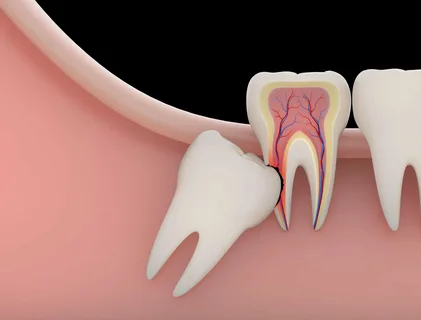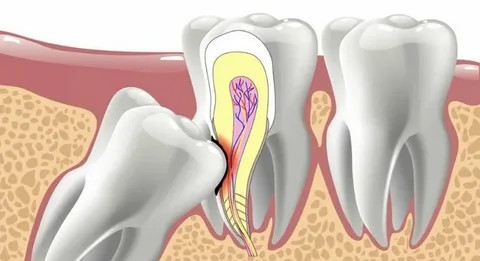Discover all there is to know about extracting your wisdom teeth, including symptoms, how to prepare, what to do during the process, how to recover, possible side effects, and frequently asked questions. With our comprehensive guidance, you can guarantee a quick recovery and great oral health.
Table of Contents
Wisdom Tooth Extraction: Everything You Need to Know
The final pair of molars that erupt in the rear of the mouth are the wisdom teeth, sometimes referred to as third molars. Some people may not have any problems with their wisdom teeth, while others may suffer from pain, discomfort, or even complications that require extraction.
Introduction to Wisdom Tooth Extraction
What are wisdom teeth?
Wisdom teeth can erupt later or never at all, although they usually do so between the ages of 17 and 25. For our predecessors, who had bigger jaws and tougher diets, these teeth were previously vital. But because of evolution, modern people frequently do not have the room in their mouths for these teeth to develop correctly.
Why do wisdom teeth need to be extracted?

Wisdom teeth can become impacted and cause a variety of issues, including infections, damage to other teeth, and cyst formation, if they are not given enough room to erupt or grow in an aligned fashion.
Signs and Symptoms
Pain and discomfort
Pain or discomfort at the back of the mouth, which frequently spreads to the jaw or ear, is one of the most typical indicators that a wisdom teeth extraction is necessary.
Swelling and inflammation
An infection or impaction may be indicated by swelling and inflammation along the gum line in the vicinity of the wisdom teeth.
Difficulty in chewing
Incorrectly positioned or impacted wisdom teeth might make it difficult to chew and bite food properly.
Preparation for Extraction
Consultation with a dentist or oral surgeon
Making an appointment with a dentist or oral surgeon is crucial if you’re having problems with your wisdom teeth.
X-rays and examination
X-rays will be obtained during the appointment to assess the location of your wisdom teeth and choose the best course of action.
Pre-operative instructions
You will get pre-operative instructions from your dentist or oral surgeon, which may include refraining from certain drugs and fasting prior to the surgery.
The Wisdom Tooth Extraction Procedure

Local anesthesia or sedation
In order to numb the surrounding tissue, local anesthetic is usually used during wisdom teeth extraction procedures. Sedation may also be administered in some situations to help you feel more at ease throughout the treatment.
Surgical extraction vs. simple extraction
The location of the wisdom teeth will determine how difficult the extraction is. In a simple extraction, the tooth is extracted by using a dental tool to loosen it; in a surgical extraction, the gum tissue may need to be sliced in order to reach the tooth.
Recovery time
You can feel some swelling and pain after the extraction, but your dentist or oral surgeon can prescribe painkillers to help you through it. After the operation, most patients recover in a few days to a week.
Aftercare and Recovery
Pain management
After the extraction, your dentist could suggest over-the-counter analgesics or, if more potent medicine is required, prescribe it to you to ease the pain and discomfort.
Keeping your mouth clean
In order to avoid infections after wisdom teeth extraction, it is crucial to maintain proper dental hygiene. This entails refraining from forceful brushing around the extraction site and softly rinsing your mouth with warm salt water.
dietary limitations
It is advised to limit your diet to soft foods that are simple to chew and won’t irritate the extraction site during the first few days of recuperation.
Potential Complications
Dry socket
Following the evacuation of a wisdom teeth, dry socket is a typical consequence that is characterized by excruciating pain and exposed bone in the socket.
Infection
Bacteria can cause infections at the extraction site, which can result in discomfort, edema, and even fever.
Nerve damage
An occasional side effect of wisdom teeth extraction is nerve injury, which can cause tingling or numbness in the chin, tongue, or lips.
In summary Of Wisdom Tooth Extraction
Wisdom tooth extraction is a popular dental operation used to treat impacted or misplaced wisdom teeth, preventing potential problems and easing pain and discomfort. You can guarantee a speedy recovery and preserve your best dental health by being aware of the warning signs and symptoms, getting ready for the treatment, and according to the recommended aftercare guidelines.

FAQs About Wisdom Tooth Extraction
What is the typical age at which wisdom teeth are extracted?
Wisdom teeth extractions usually occur between the ages of 17 and 25, however each person’s timeline may differ.
Is it painful to pull a wisdom tooth?
Even though some soreness is expected following the treatment, your dentist may normally prescribe painkillers to help control it.
How much time does it take to heal after having wisdom teeth extracted?
Although complete recovery may take several weeks, most patients recover from the treatment in a few days to a week.
Exist any alternatives to excision of the wisdom teeth?
Sometimes, your dentist will advise close observation of the wisdom teeth instead of extraction if they are not creating any issues.
How should I proceed if I have problems following the extraction?
Get in touch with your dentist or oral surgeon right away for additional assessment and treatment if you have any problems following the removal of your wisdom teeth, such as excruciating pain, swelling, or indications of infection.





